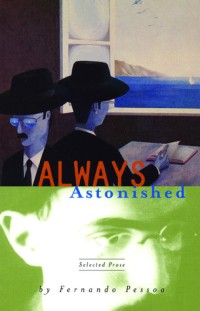
Always Astonished
تأليف : Fernando Pessoa
النوعية : مذكرات وسير ذاتية
نعتذر، هذا الكتاب غير متاح حاليًا للتحميل أو القراءة لأن المؤلف أو الناشر لا يسمح بذلك في الوقت الحالي.
“After looking for him in the poems, we search for him in the prose. The pursuit of the Other in Pessoa’s work is never-ending,” writes Edwin Honig. Essential to understanding the great Portuguese poet are the essays written about (and by) his heteronyms—Alberto Caeiro, Ricardo Reis, and Alvaro de Campos—the several pseudonyms under which he wrote an extraordinary body of poetry.
In Always Astonished, Pessoa and his several selves debate and discuss one another's work, revealing how Portuguese modernism was shaped. Fernando Pessoa is one of the great voices of twentieth-century literature, and these manifestos, letters, journal notes, and critical essays range through aesthetics, lyric poetry, dramatic and visual arts, and the psychology of the artist. He gives us, too, a singularly heterodox political position in his strange work of fiction, The Anarchist Banker.
"Eloquent, volatile and obsessed with life—and death—[Pessoa is one of the] modernist giants in whose shadow we live and who made our century one of the extraordinary richness."—The New York Times
"Only a few years ago Fernando Pessoa was all but invisible in English. Now this outsider’s outsider looms as the latest icon of modern poetry. Eugénio Lisboa devised A Centenary Pessoa in 1995, a lavish miscellany of poems, essays, biography, photographs, even paintings he inspired. Edwin Honig and Susan M. Brown reissued Poems of Fernando Pessoa, along with Honig’s Always Astonished, a selected prose."—Robert Polito, BOMB Magazine
Fernando Pessoa is Portugal's most important contemporary poet. He wrote under several identities, which he called heteronyms: Albet Caeiro, Alvaro de Campos, Ricardo Reis, and Bernardo Soares. He wrote fine poetry under his own name as well, and each of his "voices" is completely different in subject, temperament, and style.
“After looking for him in the poems, we search for him in the prose. The pursuit of the Other in Pessoa’s work is never-ending,” writes Edwin Honig. Essential to understanding the great Portuguese poet are the essays written about (and by) his heteronyms—Alberto Caeiro, Ricardo Reis, and Alvaro de Campos—the several pseudonyms under which he wrote an extraordinary body of poetry.
In Always Astonished, Pessoa and his several selves debate and discuss one another's work, revealing how Portuguese modernism was shaped. Fernando Pessoa is one of the great voices of twentieth-century literature, and these manifestos, letters, journal notes, and critical essays range through aesthetics, lyric poetry, dramatic and visual arts, and the psychology of the artist. He gives us, too, a singularly heterodox political position in his strange work of fiction, The Anarchist Banker.
"Eloquent, volatile and obsessed with life—and death—[Pessoa is one of the] modernist giants in whose shadow we live and who made our century one of the extraordinary richness."—The New York Times
"Only a few years ago Fernando Pessoa was all but invisible in English. Now this outsider’s outsider looms as the latest icon of modern poetry. Eugénio Lisboa devised A Centenary Pessoa in 1995, a lavish miscellany of poems, essays, biography, photographs, even paintings he inspired. Edwin Honig and Susan M. Brown reissued Poems of Fernando Pessoa, along with Honig’s Always Astonished, a selected prose."—Robert Polito, BOMB Magazine
Fernando Pessoa is Portugal's most important contemporary poet. He wrote under several identities, which he called heteronyms: Albet Caeiro, Alvaro de Campos, Ricardo Reis, and Bernardo Soares. He wrote fine poetry under his own name as well, and each of his "voices" is completely different in subject, temperament, and style.
المزيد...